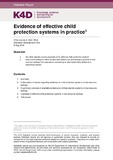| dc.contributor.author | Joynes, Chris | |
| dc.contributor.author | West, Helen | |
| dc.coverage.spatial | Cambodia | en |
| dc.coverage.spatial | Lao PDR | en |
| dc.coverage.spatial | Papua New Guinea | en |
| dc.coverage.spatial | Senegal | en |
| dc.coverage.spatial | Ghana | en |
| dc.coverage.spatial | Tanzania | en |
| dc.coverage.spatial | Kenya | en |
| dc.date.accessioned | 2019-01-03T14:20:29Z | |
| dc.date.available | 2019-01-03T14:20:29Z | |
| dc.date.issued | 2018-08-08 | |
| dc.identifier.citation | Joynes, C. & West, H. (2018). A systems approach to child protection. K4D Helpdesk Report. Brighton, UK: Institute of Development Studies | en |
| dc.identifier.uri | https://opendocs.ids.ac.uk/opendocs/handle/20.500.12413/14223 | |
| dc.description | Helpdesk | en |
| dc.description.abstract | This rapid review synthesise evidence of effective child protection systems in practice and in low resource setting. It drew largely on evaluative papers, academic papers and some grey literature. The reviewed evidence was frequently produced as part of programme assessments commissioned and published by international agencies, but undertaken by external researchers using mixed-method approaches. While the evidence reviewed was of good quality, there were also certain limitations to the content provided. The review found major challenges in assessing the impact of a national systems-based approach to child protection are the current limitations in both the availability and quality of evidence (Krueger et al. 2014; Krueger 2014: 30; Combaz 2013: 1). Firstly, in terms of availability of evidence, in many state-based contexts, there is ‘almost non-existent data’ available on the effectiveness of systems in delivering outcomes for children (Stuckenbruck 2018: 19). It is due to the relatively recent establishment of a systems approach to child protection limiting the amount of data available (Wessells, 2014; Krueger et al., 2014) and the low capacity of existing national systems to gather and process data (UNICEF 2015a: 15; UNICEF 2015c: 16; Combaz 2013: 3; Stuckenbruck 2018: 21; De Sas Kropiwnicki, 2012). Secondly, in terms of quality, there are a number of underpinning challenges, including variable definitions of systemic approaches to child protection and an inadequate consideration of contextual factors as part of programme design. Further to this, where evidence is available, the bulk of evaluative documentation focusses on programme effectiveness in terms of establishing necessary child protection mechanisms rather than in terms of impact on child protection outcomes (Wessells 2014; Combaz 2013: 4). In general, available evidence on effectiveness of child protection systems in low resource settings does not provide substantial information on the links between given systemic development practices and improved outcomes and impact for children (Combaz 2013: 1-2). Given the lack of consistency and comparability in both systematic approaches and the evidence base, it is difficult to generalise on what is effective and what is not in child protection programmes (Davis et al., 2012: 9; De Sas Kropiwnicki, 2012). In this context, it is difficult to definitively point to a specific national system that could be defined as effective. Instead, it may be more useful to focus on specific strategies that have been found to be effective in limited resource contexts (Crispin 2018). A 2012 UNICEF meta-synthesis points to a range of programme-specific factors that contribute to or shape effectiveness in child protection systems in low-resource settings (De Sas Kropiwnicki, 2012). | en |
| dc.language.iso | en | en |
| dc.publisher | IDS | en |
| dc.relation.ispartofseries | K4D Helpdesk Report;400 | |
| dc.rights.uri | https://www.nationalarchives.gov.uk/doc/open-government-licence/version/3/ | en |
| dc.subject | Children and Youth | en |
| dc.subject | Development Policy | en |
| dc.subject | Social Protection | en |
| dc.title | Evidence of Effective Child Protection Systems in Practice | en |
| dc.type | Other | en |
| dc.rights.holder | © DFID - Crown copyright 2018. | en |
| dcterms.dateAccepted | 2018-08-08 | |
| rioxxterms.funder | Department for International Development, UK Government | en |
| rioxxterms.identifier.project | K4D | en |
| rioxxterms.version | VoR | en |
| rioxxterms.funder.project | 238a9fa4-fe4a-4380-996b-995f33607ba0 | en |

